University Statistics Report: Retrieval Cues Effect on Word Memory
VerifiedAdded on 2022/12/27
|18
|3649
|68
Report
AI Summary
This statistics report investigates the impact of retrieval cues on memory recall. The study, conducted with 20 participants, compares the ability to recall words with and without the aid of retrieval cues. The research design employed an independent groups design, where participants were randomly assigned to either a cued recall group or a free recall group. The cued recall group received subheadings as retrieval cues, while the free recall group attempted to recall words without assistance. The results, analyzed using mean, median, and mode, demonstrated a significant difference in recall performance, with the cued recall group exhibiting a higher mean number of words recalled. The report includes a literature review, hypothesis formulation (both experimental and null), detailed methodology, ethical considerations, sampling procedures, and a comprehensive discussion of the findings. The study supports the experimental hypothesis that retrieval cues enhance memory and highlights the effectiveness of cues in improving recall compared to free recall. The report also includes tables and a graph to represent the results.
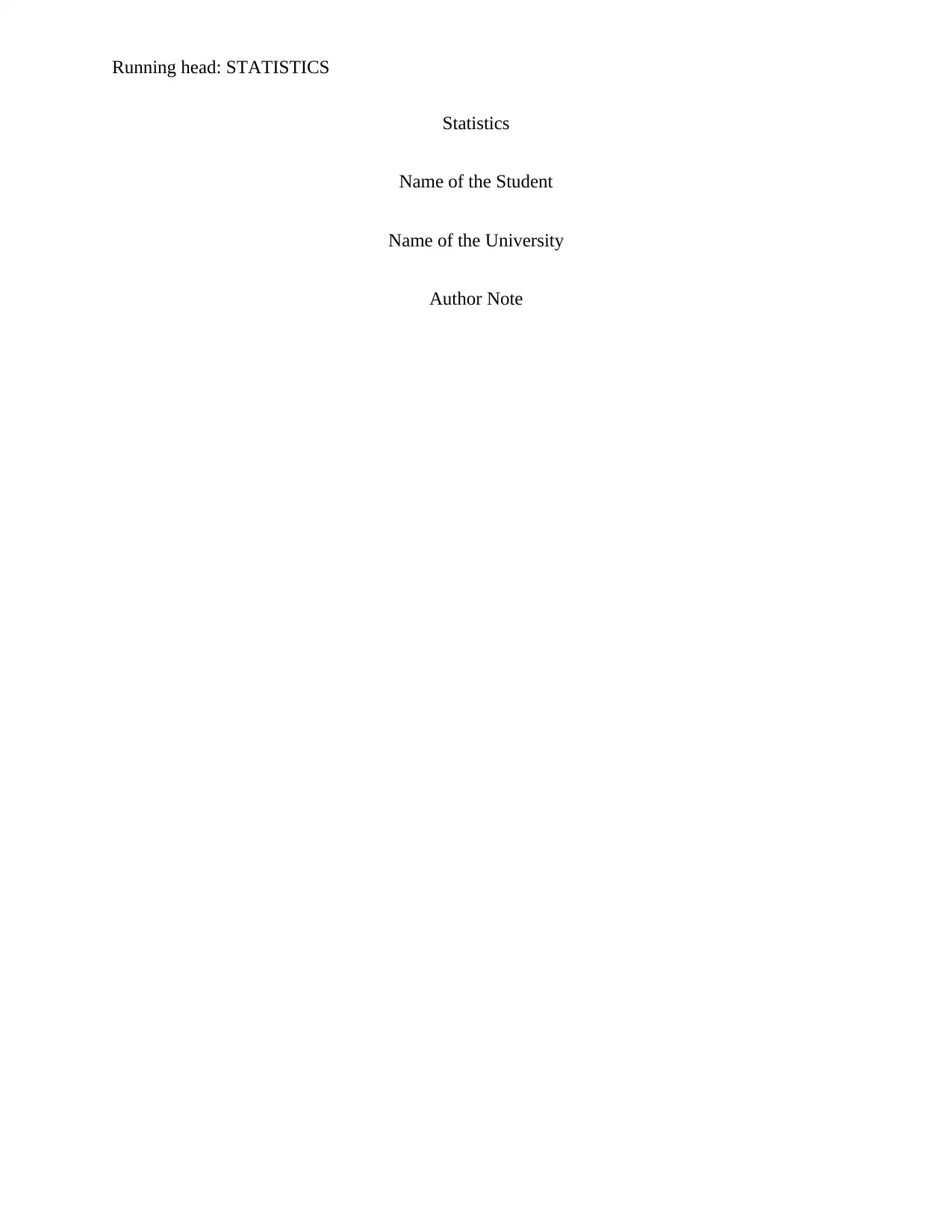
Running head: STATISTICS
Statistics
Name of the Student
Name of the University
Author Note
Statistics
Name of the Student
Name of the University
Author Note
Paraphrase This Document
Need a fresh take? Get an instant paraphrase of this document with our AI Paraphraser
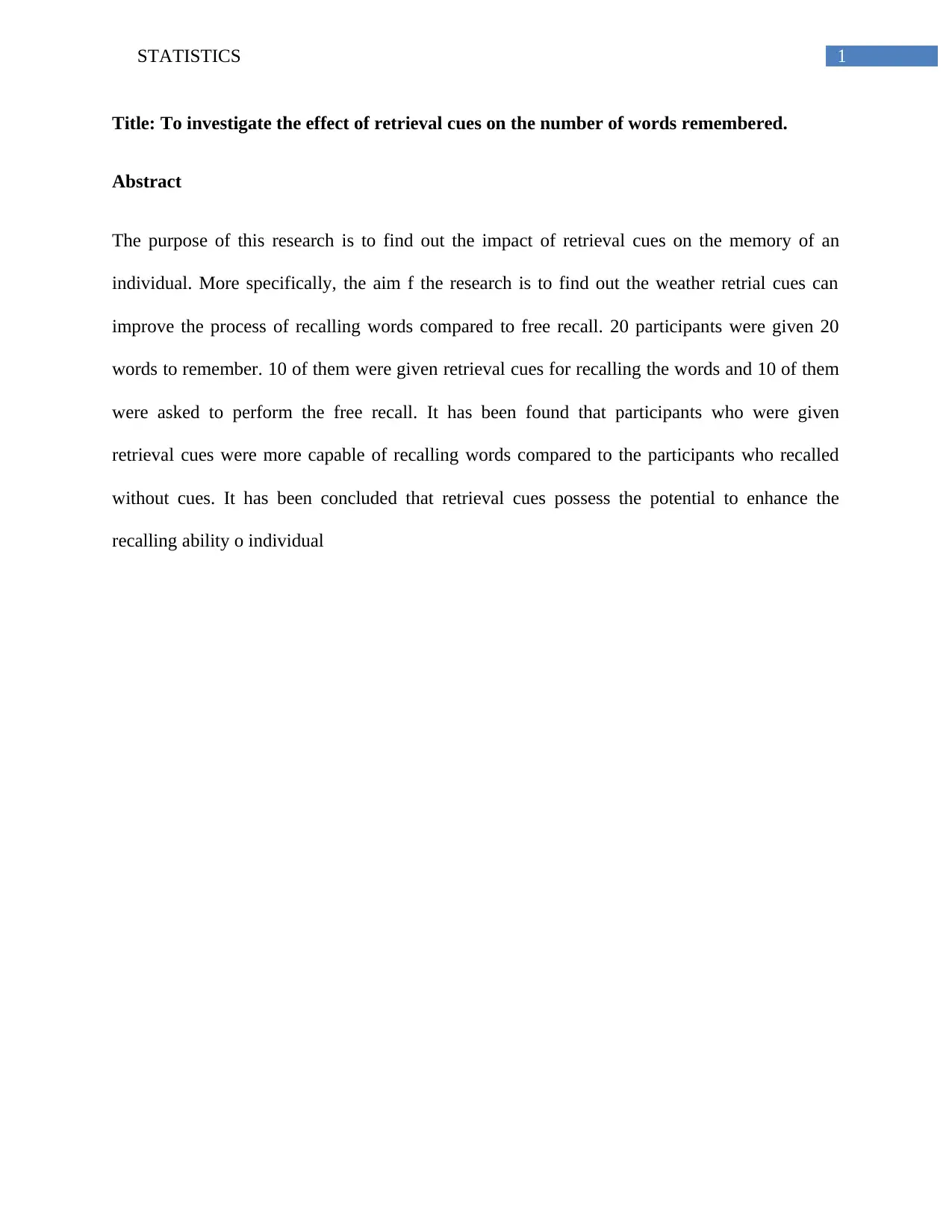
1STATISTICS
Title: To investigate the effect of retrieval cues on the number of words remembered.
Abstract
The purpose of this research is to find out the impact of retrieval cues on the memory of an
individual. More specifically, the aim f the research is to find out the weather retrial cues can
improve the process of recalling words compared to free recall. 20 participants were given 20
words to remember. 10 of them were given retrieval cues for recalling the words and 10 of them
were asked to perform the free recall. It has been found that participants who were given
retrieval cues were more capable of recalling words compared to the participants who recalled
without cues. It has been concluded that retrieval cues possess the potential to enhance the
recalling ability o individual
Title: To investigate the effect of retrieval cues on the number of words remembered.
Abstract
The purpose of this research is to find out the impact of retrieval cues on the memory of an
individual. More specifically, the aim f the research is to find out the weather retrial cues can
improve the process of recalling words compared to free recall. 20 participants were given 20
words to remember. 10 of them were given retrieval cues for recalling the words and 10 of them
were asked to perform the free recall. It has been found that participants who were given
retrieval cues were more capable of recalling words compared to the participants who recalled
without cues. It has been concluded that retrieval cues possess the potential to enhance the
recalling ability o individual
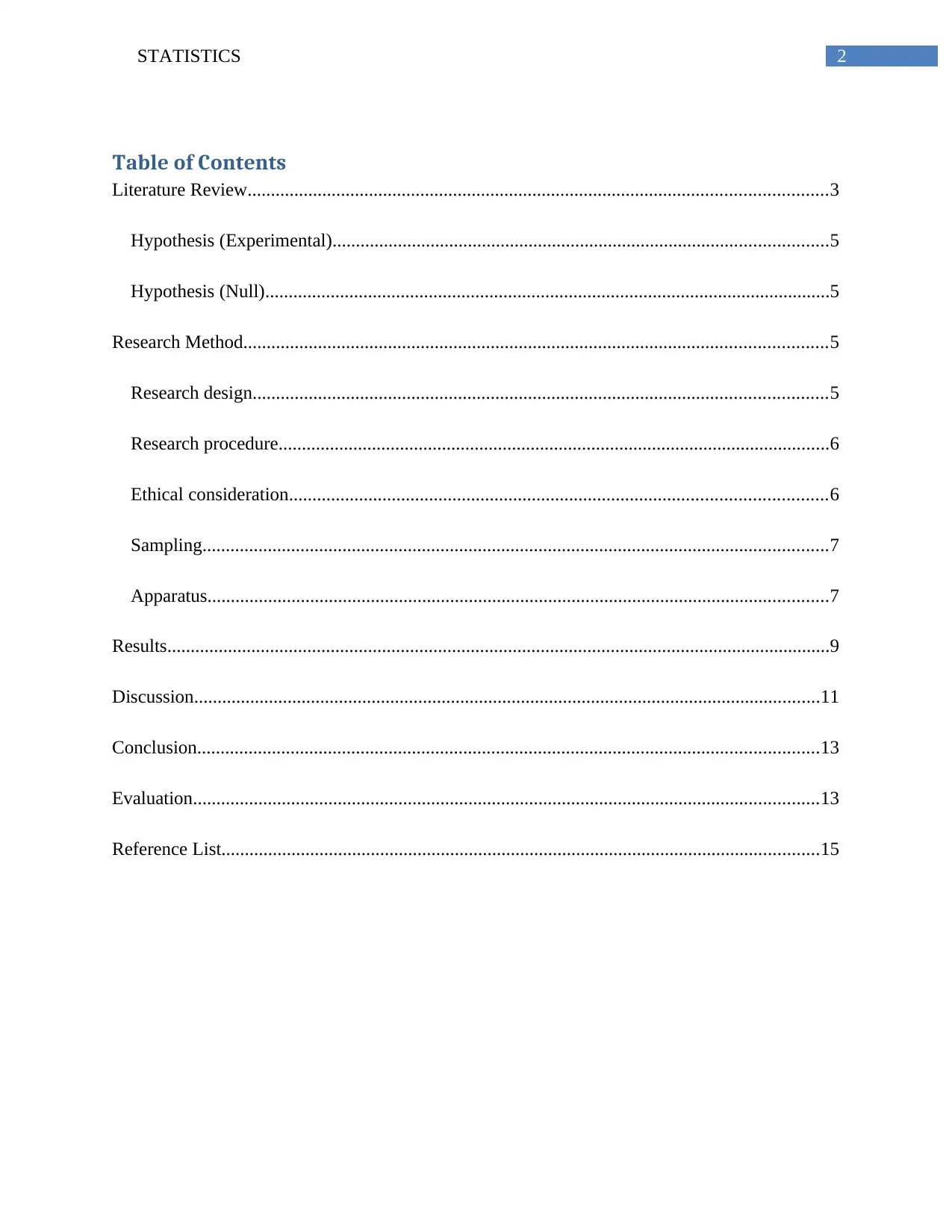
2STATISTICS
Table of Contents
Literature Review............................................................................................................................3
Hypothesis (Experimental)..........................................................................................................5
Hypothesis (Null).........................................................................................................................5
Research Method.............................................................................................................................5
Research design...........................................................................................................................5
Research procedure......................................................................................................................6
Ethical consideration...................................................................................................................6
Sampling......................................................................................................................................7
Apparatus.....................................................................................................................................7
Results..............................................................................................................................................9
Discussion......................................................................................................................................11
Conclusion.....................................................................................................................................13
Evaluation......................................................................................................................................13
Reference List................................................................................................................................15
Table of Contents
Literature Review............................................................................................................................3
Hypothesis (Experimental)..........................................................................................................5
Hypothesis (Null).........................................................................................................................5
Research Method.............................................................................................................................5
Research design...........................................................................................................................5
Research procedure......................................................................................................................6
Ethical consideration...................................................................................................................6
Sampling......................................................................................................................................7
Apparatus.....................................................................................................................................7
Results..............................................................................................................................................9
Discussion......................................................................................................................................11
Conclusion.....................................................................................................................................13
Evaluation......................................................................................................................................13
Reference List................................................................................................................................15
⊘ This is a preview!⊘
Do you want full access?
Subscribe today to unlock all pages.

Trusted by 1+ million students worldwide
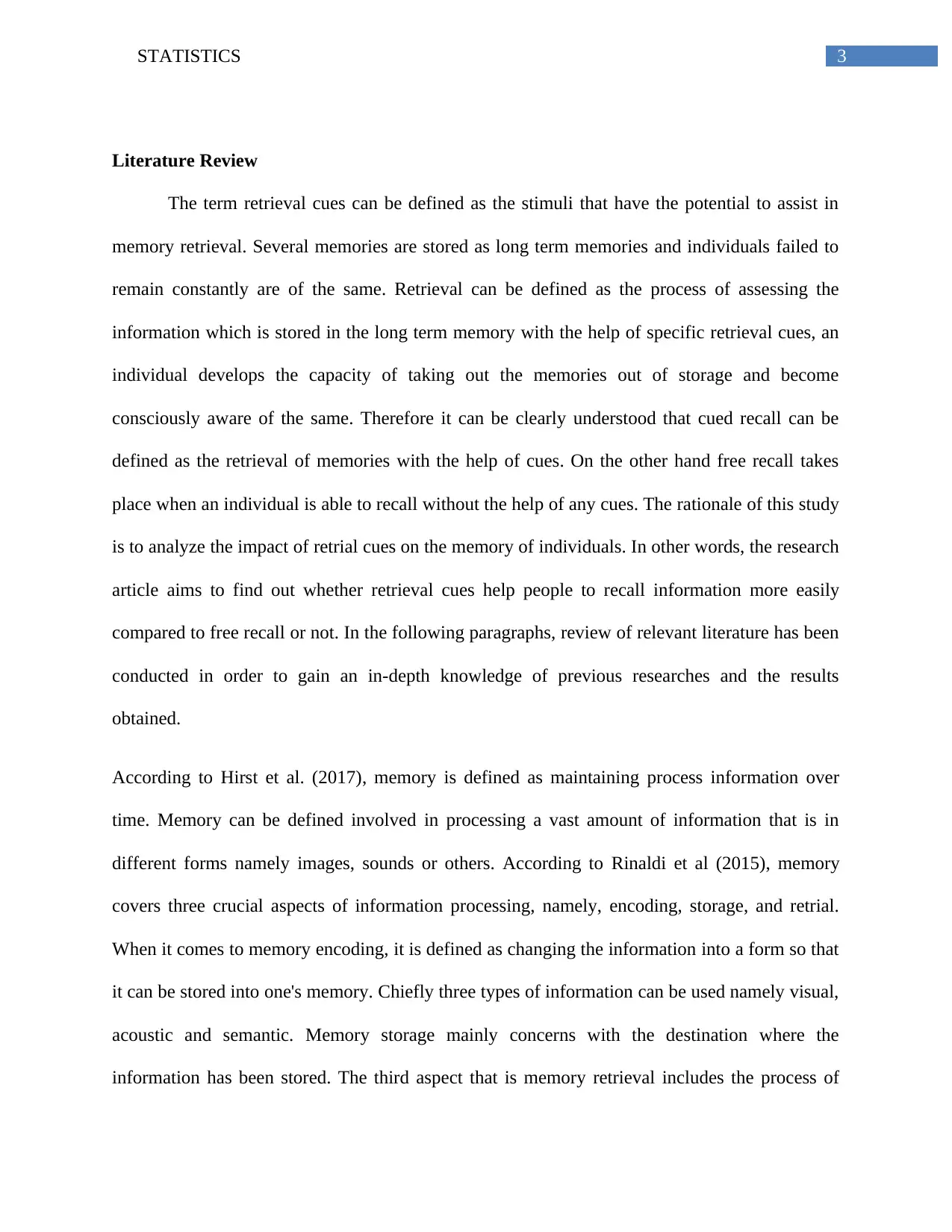
3STATISTICS
Literature Review
The term retrieval cues can be defined as the stimuli that have the potential to assist in
memory retrieval. Several memories are stored as long term memories and individuals failed to
remain constantly are of the same. Retrieval can be defined as the process of assessing the
information which is stored in the long term memory with the help of specific retrieval cues, an
individual develops the capacity of taking out the memories out of storage and become
consciously aware of the same. Therefore it can be clearly understood that cued recall can be
defined as the retrieval of memories with the help of cues. On the other hand free recall takes
place when an individual is able to recall without the help of any cues. The rationale of this study
is to analyze the impact of retrial cues on the memory of individuals. In other words, the research
article aims to find out whether retrieval cues help people to recall information more easily
compared to free recall or not. In the following paragraphs, review of relevant literature has been
conducted in order to gain an in-depth knowledge of previous researches and the results
obtained.
According to Hirst et al. (2017), memory is defined as maintaining process information over
time. Memory can be defined involved in processing a vast amount of information that is in
different forms namely images, sounds or others. According to Rinaldi et al (2015), memory
covers three crucial aspects of information processing, namely, encoding, storage, and retrial.
When it comes to memory encoding, it is defined as changing the information into a form so that
it can be stored into one's memory. Chiefly three types of information can be used namely visual,
acoustic and semantic. Memory storage mainly concerns with the destination where the
information has been stored. The third aspect that is memory retrieval includes the process of
Literature Review
The term retrieval cues can be defined as the stimuli that have the potential to assist in
memory retrieval. Several memories are stored as long term memories and individuals failed to
remain constantly are of the same. Retrieval can be defined as the process of assessing the
information which is stored in the long term memory with the help of specific retrieval cues, an
individual develops the capacity of taking out the memories out of storage and become
consciously aware of the same. Therefore it can be clearly understood that cued recall can be
defined as the retrieval of memories with the help of cues. On the other hand free recall takes
place when an individual is able to recall without the help of any cues. The rationale of this study
is to analyze the impact of retrial cues on the memory of individuals. In other words, the research
article aims to find out whether retrieval cues help people to recall information more easily
compared to free recall or not. In the following paragraphs, review of relevant literature has been
conducted in order to gain an in-depth knowledge of previous researches and the results
obtained.
According to Hirst et al. (2017), memory is defined as maintaining process information over
time. Memory can be defined involved in processing a vast amount of information that is in
different forms namely images, sounds or others. According to Rinaldi et al (2015), memory
covers three crucial aspects of information processing, namely, encoding, storage, and retrial.
When it comes to memory encoding, it is defined as changing the information into a form so that
it can be stored into one's memory. Chiefly three types of information can be used namely visual,
acoustic and semantic. Memory storage mainly concerns with the destination where the
information has been stored. The third aspect that is memory retrieval includes the process of
Paraphrase This Document
Need a fresh take? Get an instant paraphrase of this document with our AI Paraphraser
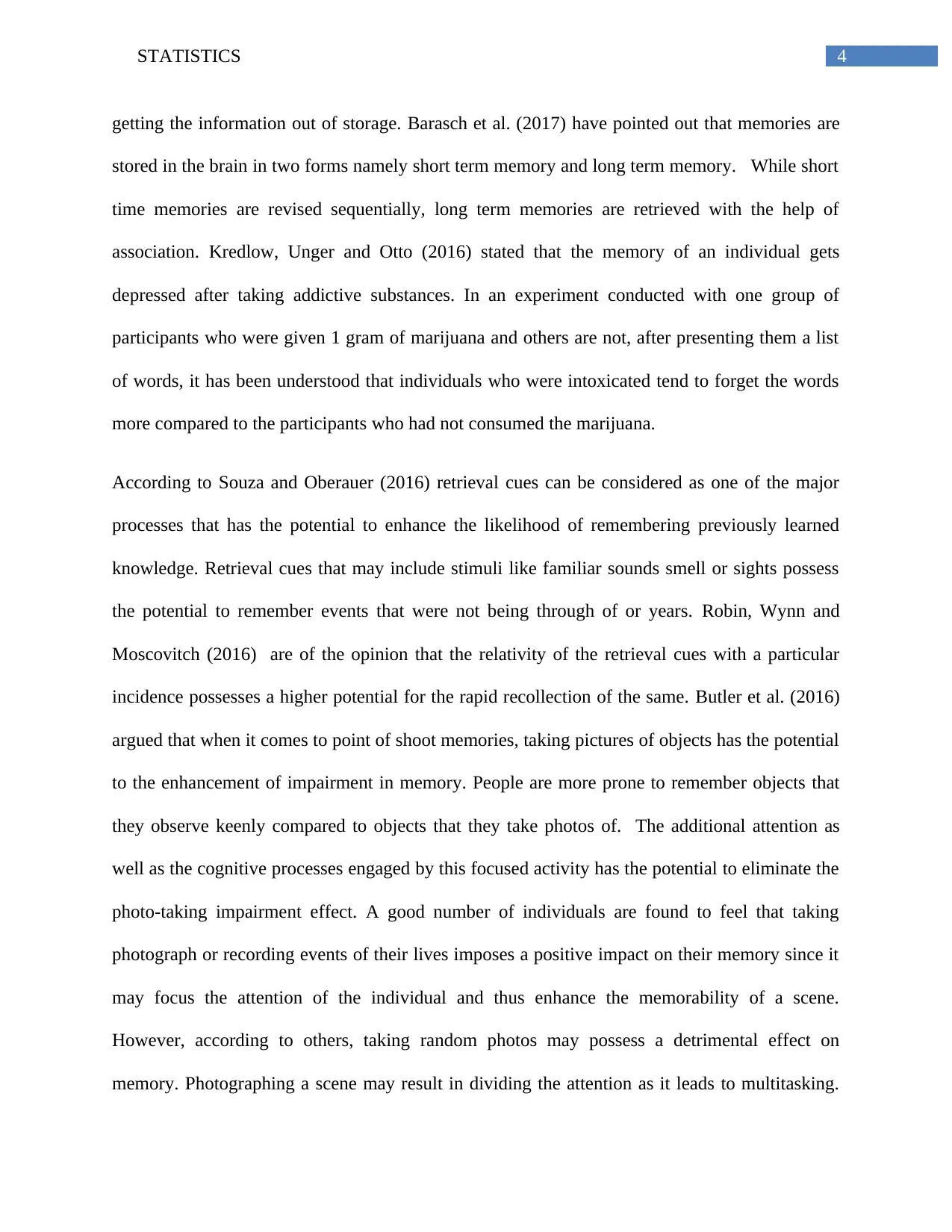
4STATISTICS
getting the information out of storage. Barasch et al. (2017) have pointed out that memories are
stored in the brain in two forms namely short term memory and long term memory. While short
time memories are revised sequentially, long term memories are retrieved with the help of
association. Kredlow, Unger and Otto (2016) stated that the memory of an individual gets
depressed after taking addictive substances. In an experiment conducted with one group of
participants who were given 1 gram of marijuana and others are not, after presenting them a list
of words, it has been understood that individuals who were intoxicated tend to forget the words
more compared to the participants who had not consumed the marijuana.
According to Souza and Oberauer (2016) retrieval cues can be considered as one of the major
processes that has the potential to enhance the likelihood of remembering previously learned
knowledge. Retrieval cues that may include stimuli like familiar sounds smell or sights possess
the potential to remember events that were not being through of or years. Robin, Wynn and
Moscovitch (2016) are of the opinion that the relativity of the retrieval cues with a particular
incidence possesses a higher potential for the rapid recollection of the same. Butler et al. (2016)
argued that when it comes to point of shoot memories, taking pictures of objects has the potential
to the enhancement of impairment in memory. People are more prone to remember objects that
they observe keenly compared to objects that they take photos of. The additional attention as
well as the cognitive processes engaged by this focused activity has the potential to eliminate the
photo-taking impairment effect. A good number of individuals are found to feel that taking
photograph or recording events of their lives imposes a positive impact on their memory since it
may focus the attention of the individual and thus enhance the memorability of a scene.
However, according to others, taking random photos may possess a detrimental effect on
memory. Photographing a scene may result in dividing the attention as it leads to multitasking.
getting the information out of storage. Barasch et al. (2017) have pointed out that memories are
stored in the brain in two forms namely short term memory and long term memory. While short
time memories are revised sequentially, long term memories are retrieved with the help of
association. Kredlow, Unger and Otto (2016) stated that the memory of an individual gets
depressed after taking addictive substances. In an experiment conducted with one group of
participants who were given 1 gram of marijuana and others are not, after presenting them a list
of words, it has been understood that individuals who were intoxicated tend to forget the words
more compared to the participants who had not consumed the marijuana.
According to Souza and Oberauer (2016) retrieval cues can be considered as one of the major
processes that has the potential to enhance the likelihood of remembering previously learned
knowledge. Retrieval cues that may include stimuli like familiar sounds smell or sights possess
the potential to remember events that were not being through of or years. Robin, Wynn and
Moscovitch (2016) are of the opinion that the relativity of the retrieval cues with a particular
incidence possesses a higher potential for the rapid recollection of the same. Butler et al. (2016)
argued that when it comes to point of shoot memories, taking pictures of objects has the potential
to the enhancement of impairment in memory. People are more prone to remember objects that
they observe keenly compared to objects that they take photos of. The additional attention as
well as the cognitive processes engaged by this focused activity has the potential to eliminate the
photo-taking impairment effect. A good number of individuals are found to feel that taking
photograph or recording events of their lives imposes a positive impact on their memory since it
may focus the attention of the individual and thus enhance the memorability of a scene.
However, according to others, taking random photos may possess a detrimental effect on
memory. Photographing a scene may result in dividing the attention as it leads to multitasking.
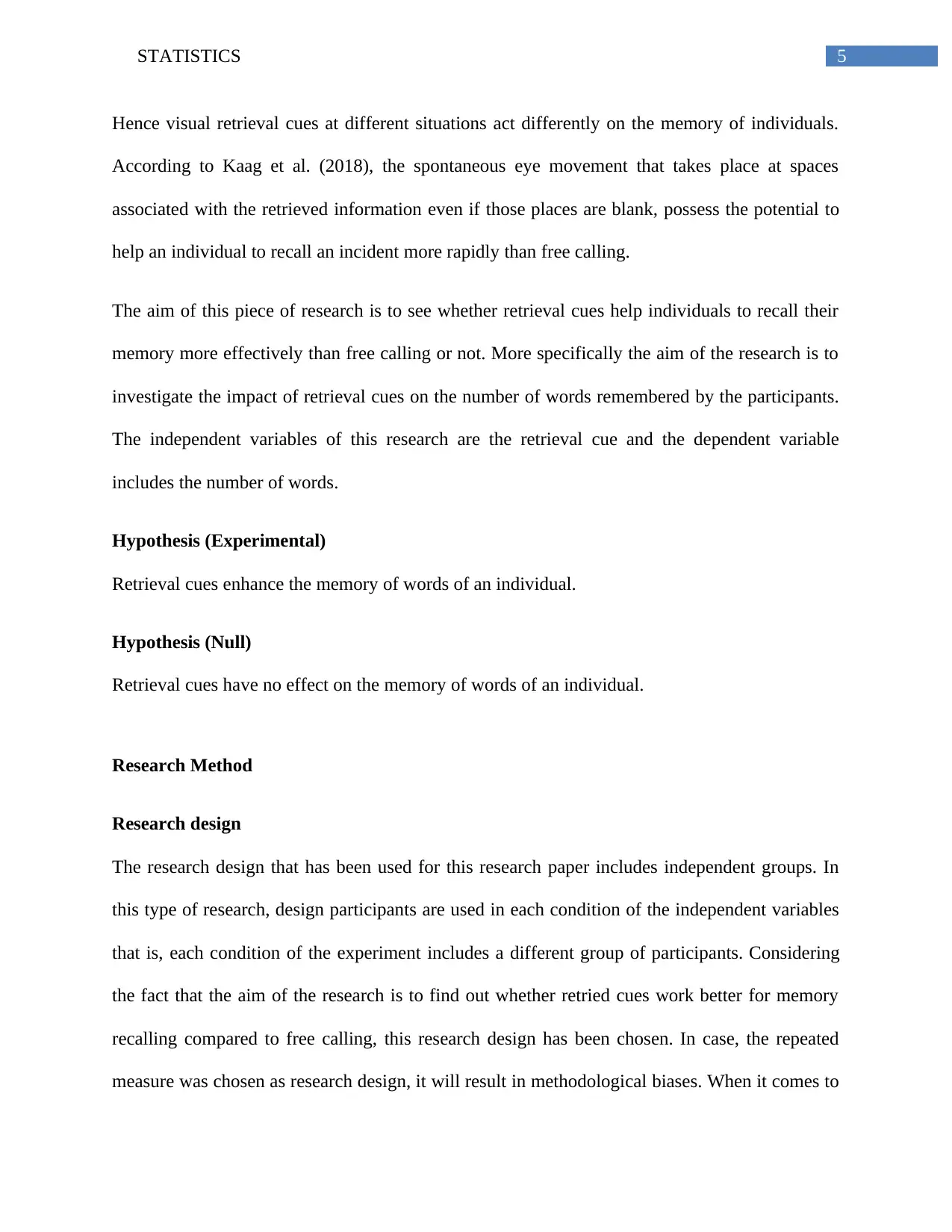
5STATISTICS
Hence visual retrieval cues at different situations act differently on the memory of individuals.
According to Kaag et al. (2018), the spontaneous eye movement that takes place at spaces
associated with the retrieved information even if those places are blank, possess the potential to
help an individual to recall an incident more rapidly than free calling.
The aim of this piece of research is to see whether retrieval cues help individuals to recall their
memory more effectively than free calling or not. More specifically the aim of the research is to
investigate the impact of retrieval cues on the number of words remembered by the participants.
The independent variables of this research are the retrieval cue and the dependent variable
includes the number of words.
Hypothesis (Experimental)
Retrieval cues enhance the memory of words of an individual.
Hypothesis (Null)
Retrieval cues have no effect on the memory of words of an individual.
Research Method
Research design
The research design that has been used for this research paper includes independent groups. In
this type of research, design participants are used in each condition of the independent variables
that is, each condition of the experiment includes a different group of participants. Considering
the fact that the aim of the research is to find out whether retried cues work better for memory
recalling compared to free calling, this research design has been chosen. In case, the repeated
measure was chosen as research design, it will result in methodological biases. When it comes to
Hence visual retrieval cues at different situations act differently on the memory of individuals.
According to Kaag et al. (2018), the spontaneous eye movement that takes place at spaces
associated with the retrieved information even if those places are blank, possess the potential to
help an individual to recall an incident more rapidly than free calling.
The aim of this piece of research is to see whether retrieval cues help individuals to recall their
memory more effectively than free calling or not. More specifically the aim of the research is to
investigate the impact of retrieval cues on the number of words remembered by the participants.
The independent variables of this research are the retrieval cue and the dependent variable
includes the number of words.
Hypothesis (Experimental)
Retrieval cues enhance the memory of words of an individual.
Hypothesis (Null)
Retrieval cues have no effect on the memory of words of an individual.
Research Method
Research design
The research design that has been used for this research paper includes independent groups. In
this type of research, design participants are used in each condition of the independent variables
that is, each condition of the experiment includes a different group of participants. Considering
the fact that the aim of the research is to find out whether retried cues work better for memory
recalling compared to free calling, this research design has been chosen. In case, the repeated
measure was chosen as research design, it will result in methodological biases. When it comes to
⊘ This is a preview!⊘
Do you want full access?
Subscribe today to unlock all pages.

Trusted by 1+ million students worldwide
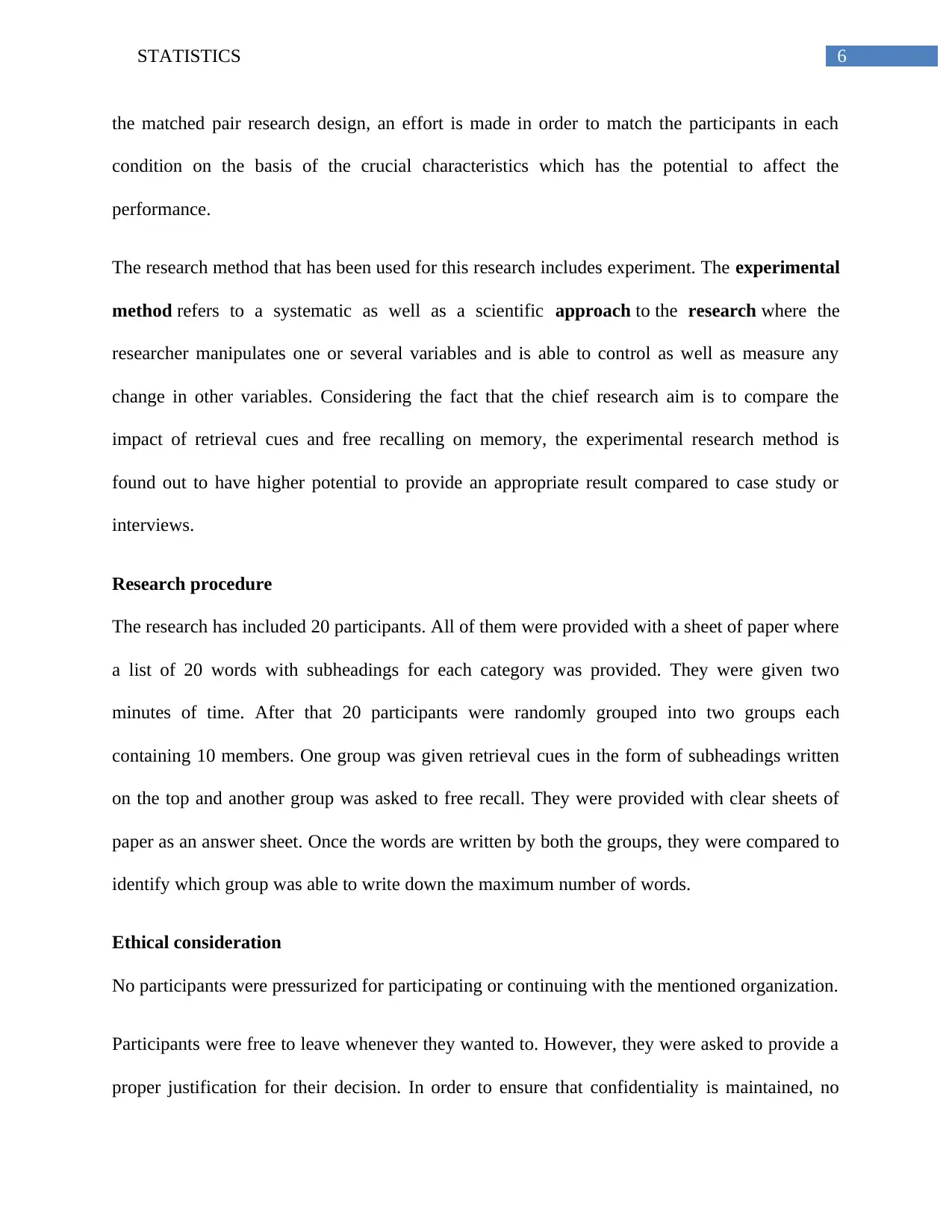
6STATISTICS
the matched pair research design, an effort is made in order to match the participants in each
condition on the basis of the crucial characteristics which has the potential to affect the
performance.
The research method that has been used for this research includes experiment. The experimental
method refers to a systematic as well as a scientific approach to the research where the
researcher manipulates one or several variables and is able to control as well as measure any
change in other variables. Considering the fact that the chief research aim is to compare the
impact of retrieval cues and free recalling on memory, the experimental research method is
found out to have higher potential to provide an appropriate result compared to case study or
interviews.
Research procedure
The research has included 20 participants. All of them were provided with a sheet of paper where
a list of 20 words with subheadings for each category was provided. They were given two
minutes of time. After that 20 participants were randomly grouped into two groups each
containing 10 members. One group was given retrieval cues in the form of subheadings written
on the top and another group was asked to free recall. They were provided with clear sheets of
paper as an answer sheet. Once the words are written by both the groups, they were compared to
identify which group was able to write down the maximum number of words.
Ethical consideration
No participants were pressurized for participating or continuing with the mentioned organization.
Participants were free to leave whenever they wanted to. However, they were asked to provide a
proper justification for their decision. In order to ensure that confidentiality is maintained, no
the matched pair research design, an effort is made in order to match the participants in each
condition on the basis of the crucial characteristics which has the potential to affect the
performance.
The research method that has been used for this research includes experiment. The experimental
method refers to a systematic as well as a scientific approach to the research where the
researcher manipulates one or several variables and is able to control as well as measure any
change in other variables. Considering the fact that the chief research aim is to compare the
impact of retrieval cues and free recalling on memory, the experimental research method is
found out to have higher potential to provide an appropriate result compared to case study or
interviews.
Research procedure
The research has included 20 participants. All of them were provided with a sheet of paper where
a list of 20 words with subheadings for each category was provided. They were given two
minutes of time. After that 20 participants were randomly grouped into two groups each
containing 10 members. One group was given retrieval cues in the form of subheadings written
on the top and another group was asked to free recall. They were provided with clear sheets of
paper as an answer sheet. Once the words are written by both the groups, they were compared to
identify which group was able to write down the maximum number of words.
Ethical consideration
No participants were pressurized for participating or continuing with the mentioned organization.
Participants were free to leave whenever they wanted to. However, they were asked to provide a
proper justification for their decision. In order to ensure that confidentiality is maintained, no
Paraphrase This Document
Need a fresh take? Get an instant paraphrase of this document with our AI Paraphraser
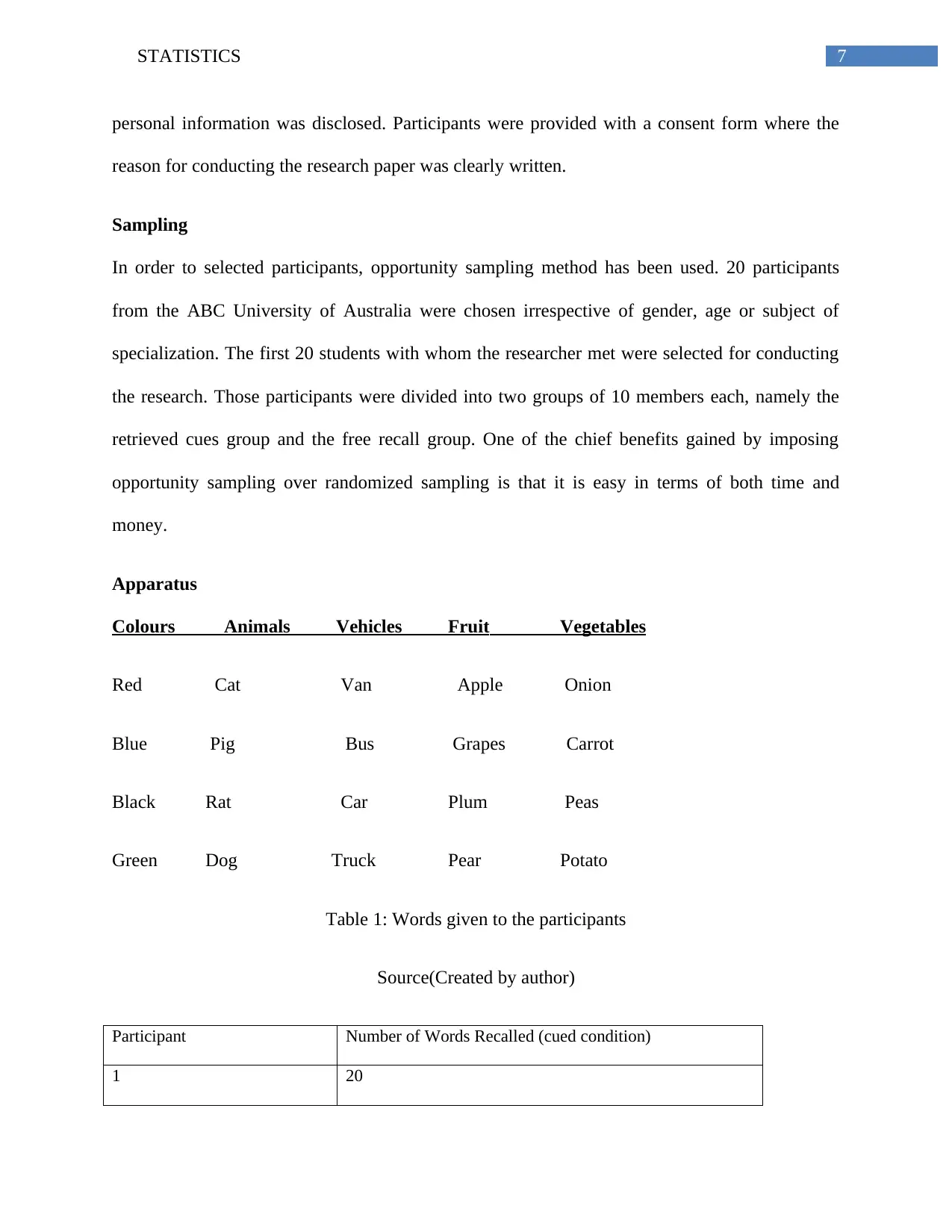
7STATISTICS
personal information was disclosed. Participants were provided with a consent form where the
reason for conducting the research paper was clearly written.
Sampling
In order to selected participants, opportunity sampling method has been used. 20 participants
from the ABC University of Australia were chosen irrespective of gender, age or subject of
specialization. The first 20 students with whom the researcher met were selected for conducting
the research. Those participants were divided into two groups of 10 members each, namely the
retrieved cues group and the free recall group. One of the chief benefits gained by imposing
opportunity sampling over randomized sampling is that it is easy in terms of both time and
money.
Apparatus
Colours Animals Vehicles Fruit Vegetables
Red Cat Van Apple Onion
Blue Pig Bus Grapes Carrot
Black Rat Car Plum Peas
Green Dog Truck Pear Potato
Table 1: Words given to the participants
Source(Created by author)
Participant Number of Words Recalled (cued condition)
1 20
personal information was disclosed. Participants were provided with a consent form where the
reason for conducting the research paper was clearly written.
Sampling
In order to selected participants, opportunity sampling method has been used. 20 participants
from the ABC University of Australia were chosen irrespective of gender, age or subject of
specialization. The first 20 students with whom the researcher met were selected for conducting
the research. Those participants were divided into two groups of 10 members each, namely the
retrieved cues group and the free recall group. One of the chief benefits gained by imposing
opportunity sampling over randomized sampling is that it is easy in terms of both time and
money.
Apparatus
Colours Animals Vehicles Fruit Vegetables
Red Cat Van Apple Onion
Blue Pig Bus Grapes Carrot
Black Rat Car Plum Peas
Green Dog Truck Pear Potato
Table 1: Words given to the participants
Source(Created by author)
Participant Number of Words Recalled (cued condition)
1 20
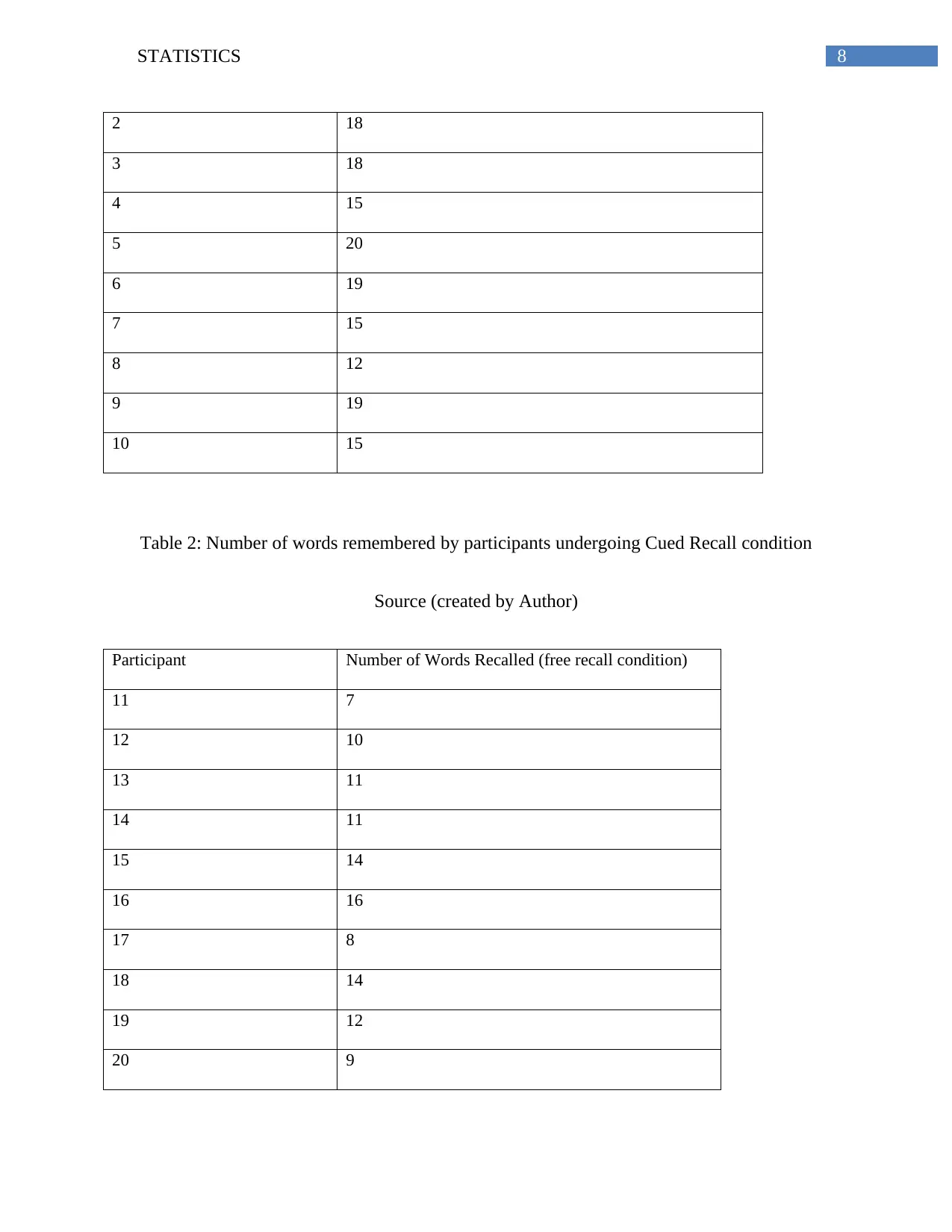
8STATISTICS
2 18
3 18
4 15
5 20
6 19
7 15
8 12
9 19
10 15
Table 2: Number of words remembered by participants undergoing Cued Recall condition
Source (created by Author)
Participant Number of Words Recalled (free recall condition)
11 7
12 10
13 11
14 11
15 14
16 16
17 8
18 14
19 12
20 9
2 18
3 18
4 15
5 20
6 19
7 15
8 12
9 19
10 15
Table 2: Number of words remembered by participants undergoing Cued Recall condition
Source (created by Author)
Participant Number of Words Recalled (free recall condition)
11 7
12 10
13 11
14 11
15 14
16 16
17 8
18 14
19 12
20 9
⊘ This is a preview!⊘
Do you want full access?
Subscribe today to unlock all pages.

Trusted by 1+ million students worldwide
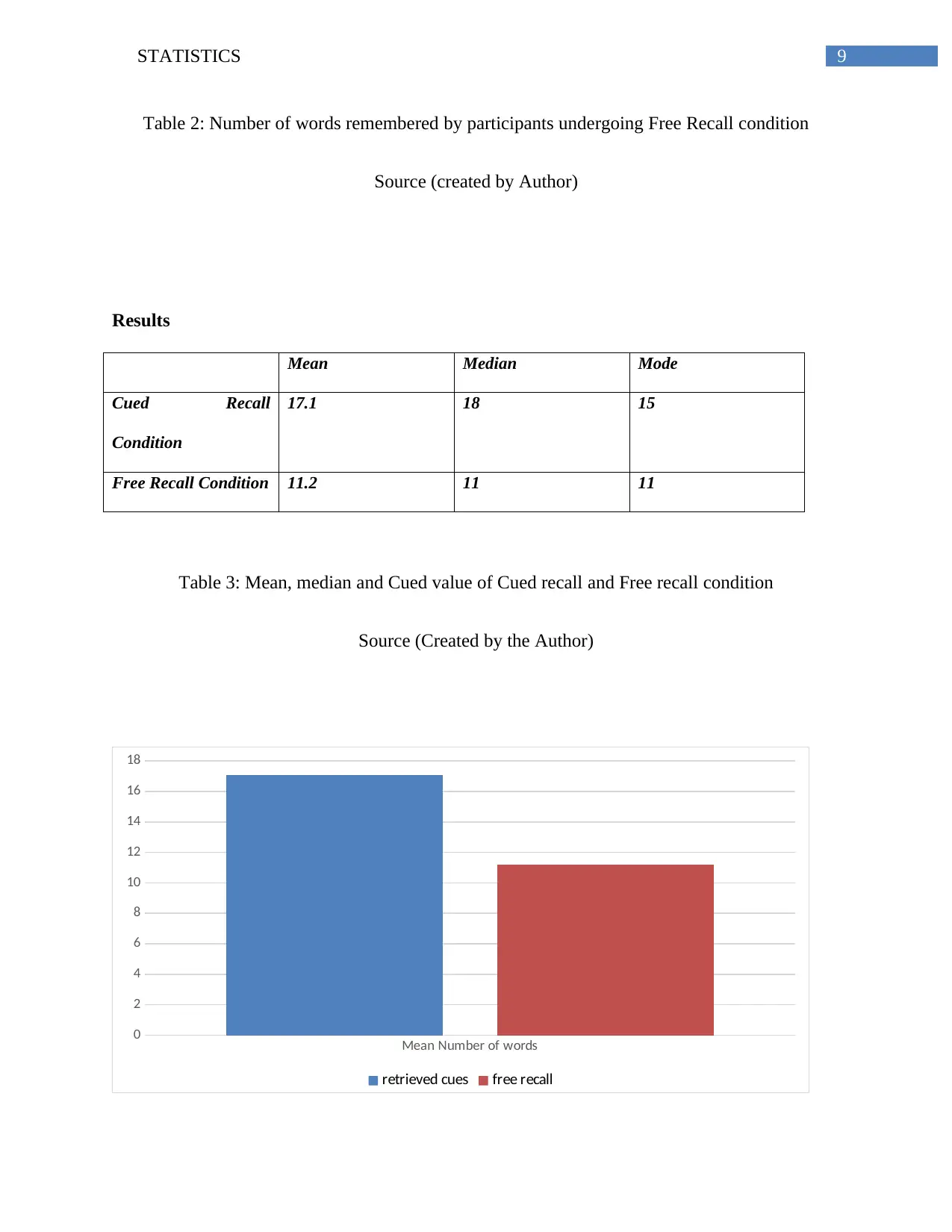
9STATISTICS
Table 2: Number of words remembered by participants undergoing Free Recall condition
Source (created by Author)
Results
Mean Median Mode
Cued Recall
Condition
17.1 18 15
Free Recall Condition 11.2 11 11
Table 3: Mean, median and Cued value of Cued recall and Free recall condition
Source (Created by the Author)
Mean Number of words
0
2
4
6
8
10
12
14
16
18
retrieved cues free recall
Table 2: Number of words remembered by participants undergoing Free Recall condition
Source (created by Author)
Results
Mean Median Mode
Cued Recall
Condition
17.1 18 15
Free Recall Condition 11.2 11 11
Table 3: Mean, median and Cued value of Cued recall and Free recall condition
Source (Created by the Author)
Mean Number of words
0
2
4
6
8
10
12
14
16
18
retrieved cues free recall
Paraphrase This Document
Need a fresh take? Get an instant paraphrase of this document with our AI Paraphraser
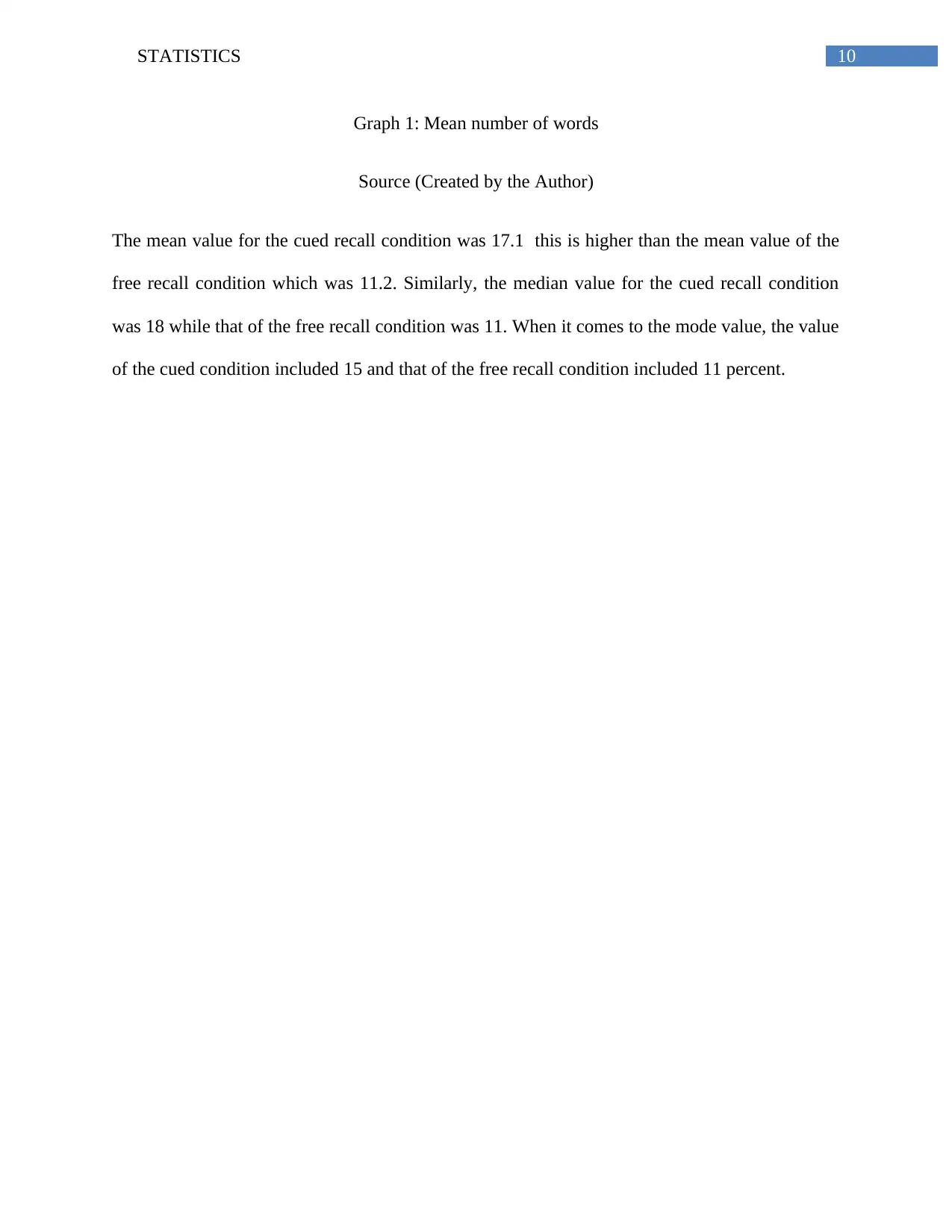
10STATISTICS
Graph 1: Mean number of words
Source (Created by the Author)
The mean value for the cued recall condition was 17.1 this is higher than the mean value of the
free recall condition which was 11.2. Similarly, the median value for the cued recall condition
was 18 while that of the free recall condition was 11. When it comes to the mode value, the value
of the cued condition included 15 and that of the free recall condition included 11 percent.
Graph 1: Mean number of words
Source (Created by the Author)
The mean value for the cued recall condition was 17.1 this is higher than the mean value of the
free recall condition which was 11.2. Similarly, the median value for the cued recall condition
was 18 while that of the free recall condition was 11. When it comes to the mode value, the value
of the cued condition included 15 and that of the free recall condition included 11 percent.
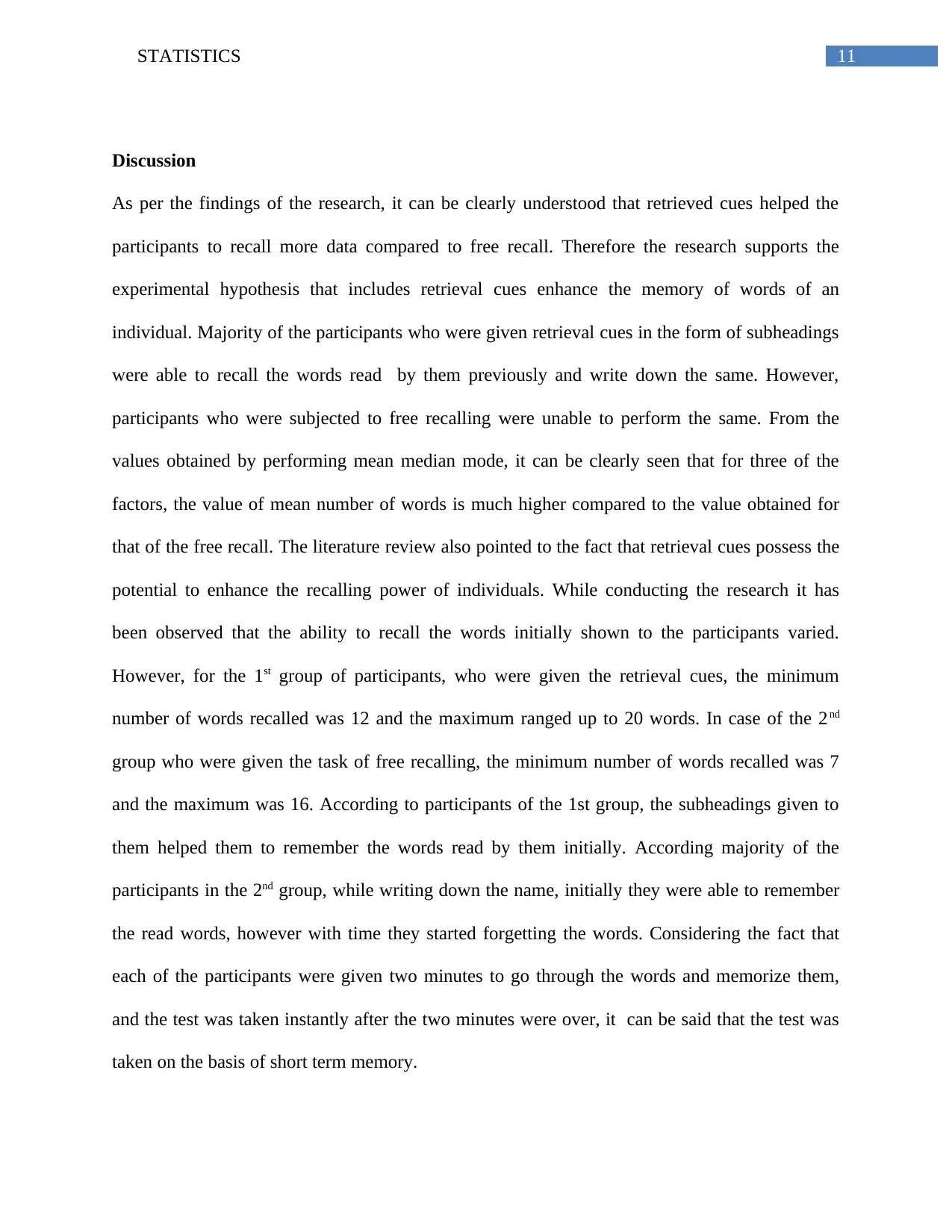
11STATISTICS
Discussion
As per the findings of the research, it can be clearly understood that retrieved cues helped the
participants to recall more data compared to free recall. Therefore the research supports the
experimental hypothesis that includes retrieval cues enhance the memory of words of an
individual. Majority of the participants who were given retrieval cues in the form of subheadings
were able to recall the words read by them previously and write down the same. However,
participants who were subjected to free recalling were unable to perform the same. From the
values obtained by performing mean median mode, it can be clearly seen that for three of the
factors, the value of mean number of words is much higher compared to the value obtained for
that of the free recall. The literature review also pointed to the fact that retrieval cues possess the
potential to enhance the recalling power of individuals. While conducting the research it has
been observed that the ability to recall the words initially shown to the participants varied.
However, for the 1st group of participants, who were given the retrieval cues, the minimum
number of words recalled was 12 and the maximum ranged up to 20 words. In case of the 2nd
group who were given the task of free recalling, the minimum number of words recalled was 7
and the maximum was 16. According to participants of the 1st group, the subheadings given to
them helped them to remember the words read by them initially. According majority of the
participants in the 2nd group, while writing down the name, initially they were able to remember
the read words, however with time they started forgetting the words. Considering the fact that
each of the participants were given two minutes to go through the words and memorize them,
and the test was taken instantly after the two minutes were over, it can be said that the test was
taken on the basis of short term memory.
Discussion
As per the findings of the research, it can be clearly understood that retrieved cues helped the
participants to recall more data compared to free recall. Therefore the research supports the
experimental hypothesis that includes retrieval cues enhance the memory of words of an
individual. Majority of the participants who were given retrieval cues in the form of subheadings
were able to recall the words read by them previously and write down the same. However,
participants who were subjected to free recalling were unable to perform the same. From the
values obtained by performing mean median mode, it can be clearly seen that for three of the
factors, the value of mean number of words is much higher compared to the value obtained for
that of the free recall. The literature review also pointed to the fact that retrieval cues possess the
potential to enhance the recalling power of individuals. While conducting the research it has
been observed that the ability to recall the words initially shown to the participants varied.
However, for the 1st group of participants, who were given the retrieval cues, the minimum
number of words recalled was 12 and the maximum ranged up to 20 words. In case of the 2nd
group who were given the task of free recalling, the minimum number of words recalled was 7
and the maximum was 16. According to participants of the 1st group, the subheadings given to
them helped them to remember the words read by them initially. According majority of the
participants in the 2nd group, while writing down the name, initially they were able to remember
the read words, however with time they started forgetting the words. Considering the fact that
each of the participants were given two minutes to go through the words and memorize them,
and the test was taken instantly after the two minutes were over, it can be said that the test was
taken on the basis of short term memory.
⊘ This is a preview!⊘
Do you want full access?
Subscribe today to unlock all pages.

Trusted by 1+ million students worldwide
1 out of 18
Related Documents
Your All-in-One AI-Powered Toolkit for Academic Success.
+13062052269
info@desklib.com
Available 24*7 on WhatsApp / Email
![[object Object]](/_next/static/media/star-bottom.7253800d.svg)
Unlock your academic potential
Copyright © 2020–2026 A2Z Services. All Rights Reserved. Developed and managed by ZUCOL.





